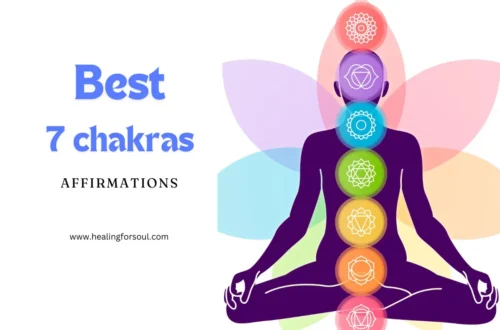Table of Contents
Importance of choosing the right mantra.
Choosing The right mantra can profoundly impact our mental, emotional, and spiritual well-being. It can serve as a guiding light, helping us navigate life’s challenges with grace and resilience. This article will explore the power of mantras and guide how to choose the perfect mantra for you.
Mantras are sacred words or phrases that hold spiritual significance in various cultures and traditions. They are often repeated during meditation or prayer to focus the mind and evoke a sense of calm and inner peace. Mantras can range from simple syllables to complex verses, each carrying its unique vibrations and meanings.
Know the Types Of Mantras
Mantras have used spiritual work and meditation as devices, having narrowed their activities to focus the mind and cultivate certain qualities or energies. So, before going for the selection of a mantra, it has to be borne in mind that there are different varieties available. Mantras can be classified under three primary classes
Bija Mantras
These are single-syllable sounds or seed sounds that are believed to have inherent power. Each bija mantra is associated with a particular deity or aspect of the divine and is chanted to invoke its energy. For instance, the bija mantra “Om” comes under cosmic vibration and is considered the most fundamental mantra in Hinduism as well as other Eastern spiritual traditions.
Vedic Mantras
Originating from the old Vedic texts, these are chanted by practitioners in Sanskrit during rituals and ceremonies. Vedic mantras are believed to carry vibratory potential that can align the practitioner with cosmic principles and higher states of consciousness.
Tantric Mantras
These are derived from Tantric texts, and they are hence much more intricate and complex than the others. Tantric mantras may encompass longer phrases or sentences and are associated with specific rituals, deities, or spiritual objectives.
Each kind of mantra has got its purpose and effect, so the choice would be on one’s spiritual path, goal, and resonance with the sound vibrations. Some might get more interested in the simplicity and purity of the sounds of bija mantras, while others are inclined to enter the rich tradition and symbolism of Vedic mantras or access the transforming power of Tantric mantras. It is important to experiment with various mantras, perhaps under the guidance of a spiritual teacher or mentor, to know what resonates most deeply within your inner being and aspirations.
Factors To Consider
Personal goals and aspirations.
When choosing a mantra, it’s important to consider your personal goals and aspirations. What do you want to achieve in your life? What qualities or attributes do you want to cultivate? By clarifying your intentions and desires, you can select a mantra that aligns with your values and resonates with your heart and soul.
Emotional resonance
In addition to your goals and aspirations, it’s essential to choose a mantra that has emotional resonance for you. The words or phrases of the mantra should evoke feelings of joy, peace, love, or empowerment within you. Trust your intuition and listen to your heart when selecting a mantra, as it knows what you need better than anyone else.
Cultural and spiritual beliefs
Lastly, consider your cultural and spiritual beliefs when choosing a mantra. Different traditions have their own unique mantras and practices, so it’s essential to choose one that aligns with your worldview and resonates with your soul. Whether you follow Hinduism, Buddhism, Christianity, or another spiritual path, there’s a mantra out there that can support you on your journey of self-discovery and growth.
Reflecting Your Goal
Identifying areas of improvement
Before choosing a mantra, take some time to reflect on your goals and aspirations. What areas of your life do you want to improve or change? Is there a particular challenge or obstacle that you’re facing? By identifying areas of growth and development, you can select a mantra that addresses your specific needs and supports you on your journey.
Setting intentions for personal growth
Once you’ve identified your goals, it’s important to set clear intentions for your personal growth. What qualities or attributes do you want to cultivate within yourself? How do you want to show up in the world? By setting intentions that are aligned with your values and aspirations, you can create a roadmap for success and fulfillment.
Tailoring Mantras to Your Needs
Selecting the right mantra is a very personal process based on understanding your needs and goals individually. Mantras are vital tools in focusing the mind, cultivating positive energy, and manifesting intentions. Based on your life’s areas where you need improvement or transformation, customize your mantra. Whether it is overcoming obstacles, inner peace, or creativity, your mantra should resonate with your intentions. Consider what attributes you would like to embody and what you are wishing to change. Once you have clarity over your intentions, look at different mantras from various spiritual traditions or create your own personalized affirmation. Test out phrases and feel which ones are connecting with you in terms of alignment and empowerment. Remember, the right mantra is potent in lifting your spirit, amplifying your intentions, and effectuating positive change in your life.
FAQs:
Q1. What are the types of mantras?
A1. The types of mantras include Bija Mantras, Vedic Mantras, and Tantric Mantras.
Q2. What are Bija Mantras?
A2. Bija Mantras are single-syllable sounds associated with specific deities or aspects of the divine, such as the widely known “Om.”
Q3. Where do Vedic Mantras originate from?
A3. Vedic Mantras originate from ancient Vedic texts and are chanted in Sanskrit during rituals and ceremonies.
Q4. What are Tantric Mantras known for?
A4. Tantric Mantras, derived from Tantric texts, are complex and associated with specific rituals, deities, or spiritual objectives.
Q5. How should one select the right mantra?
A5. To select the right mantra, consider personal goals, emotional resonance, cultural and spiritual beliefs, areas of improvement, and intentions for personal growth.







